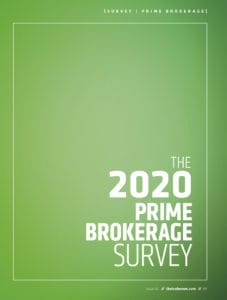 The 2020 edition of the Prime Brokerage Survey from The TRADE’s sister publication, Global Custodian, was conducted in what might be described as unusual circumstances. Both providers and respondents were working remotely as the COVID-19 pandemic gathered pace and the survey was launched.
The 2020 edition of the Prime Brokerage Survey from The TRADE’s sister publication, Global Custodian, was conducted in what might be described as unusual circumstances. Both providers and respondents were working remotely as the COVID-19 pandemic gathered pace and the survey was launched.
Notably, it was a time when both prime brokers and their clients were feeling their way through a period of extreme market volatility, heightened risks and collateral demands.
We are therefore particularly grateful to all those who engaged with the process in 2020, a year that could be defined as trying. Overall, the survey received 545 completed and validated responses, which allowed for analysis of the nine prime brokers profiled in this version of the results.
Figure 1 shows that the overall average score increased slightly from 5.80 in 2019 to 5.89 in 2020, while increases were recorded across six of the seven categories analysed.
Post-trade processes have perhaps been an area of focus for prime brokers in 2020, as the OTC Clearing category achieved the largest gains (+0.23), with an increase from 5.75 in 2019 to 5.98 in this year’s survey.
It could also be argued that prime brokers have made investments in their Foreign Exchange Prime Brokerage (+0.19) and Delta 1, Swaps and Financing (+0.19) capabilities, as those categories were among the largest increases in average scores in 2020 compared to the year prior.
Stock Borrowing and Lending scores remained steady (+0.02) in the 2020 results, with marginal gains noted across the Fixed Income (+0.1) and Listed Derivatives (+0.06) categories.
At the other end of the scale, the only category to record a decline was Trading and Execution, an area that will be of significant interest to The TRADE’s readers. The weighted average score for Trading and Execution declined from 6.00, the largest score of the seven categories in the 2019 results, to 5.83 in 2020.
Figure 2 shows a breakdown of the regional distribution of respondents, revealing that a majority of 75% of firms surveyed are based in North America, followed by 17% in the Asia Pacific region and 8% in Europe.
For responses by client size, Figure 3 highlights that 44% are on the smaller end of the spectrum, with up to $500 million of assets under management (AuM). This was followed by just under a third (27%) of responses that fall in the mid-sized range, managing between $1 – 10 billion in assets, whilst 13% are recorded as managing $10 billion or more. In terms of strategies, Figure 4 displays that the bulk of respondents (69%) deploy equity hedge investment strategies, followed by relative value (18%) and event-driven (6%).
For numbers of prime brokers used, Figure 5 reveals that the larger hedge fund managers generally use more providers than their smaller peers. Although, respondents with $1 – 5 billion AuM use the most providers with an average number of 4.5 recorded. This was followed by respondents managing more than $100 billion, which use an average number of 4.3 providers.
Smaller hedge fund respondents with $100 – 500 million AuM, as well as those with $10 – 25 billion, use an average of 2.7 prime brokers, while respondents in the $25 – 50 billion AuM range use an average of 4 prime broker providers.
Unlike the financial crisis of the previous decade, the COVID-19 pandemic does not appear to have impacted relationships with financial institutions in the same way, as evidenced by the increase in average score for providers in the 2020 survey.
The market turmoil of 2020 sparked a delicate dance between prime brokers and their clients. Relationships had to be managed carefully with consistent communication on counterparty risk, credit risk, deleveraging and financing, all in an environment where the entire financial services industry shifted to remote working.
While there is debatably room for improvement in execution services for providers, increases in the weighted average score in six of the seven categories analysed in this version of the survey suggest that providers have stepped up for their hedge fund clients in this crisis.
To view the full 2020 Prime Brokerage results including provider write-ups, please click here.